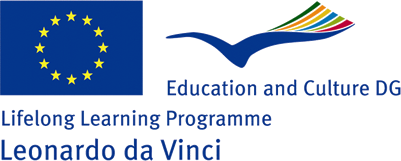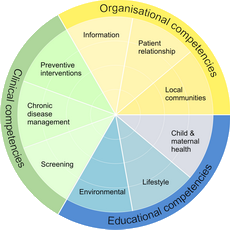In 2002
WONCA (World Organization of National Colleges, Academies and Academic Associations of General Practitioners/Family Physicians) published the new European Definition of Family Medicine. This definition contains 11 characteristics which are fundamental to the family medicine and are generalisable to all health-care system regardless of contextual differences. These were then combined into a role of GP. Education of GP should be focused on gaining an understanding of the eleven characteristics of the disciplines in the WONCA definition. Two of them are:
- promotes health and well being both by appropriate and effective intervention,
- has a specific responsibility for the health of the community.
In majority of European countries family physician’s profession is a fundamental part of health care systems. They play a crucial role in acquiring appropriate health care protection which quality depends on the level of GPs’ competences. Particularly important element of their activities are those in the field of disease prevention and health promotion. Properly educated and adequately equipped family physician not only treats diseases, but also solves the patients problems and strengthens his health. GPs’ activities should be focused on local society – of which he is a member and is close to. All this tasks are essence of family medicine idea. In order to properly accomplish these responsibilities GP must have the possibility to achieve appropriate knowledge and competences which enables him to work effectively. Adequate educational program is a prerequisite for GPs’ to give the patients medical, mental and social support. Additionally, its essential for active participation of family physicians in preparation, implementation, exploitation and evaluation of health care programs focused on the local society.
The main goal this project is to define what are in practice the competencies of the GPs in the field of health promotion and diseases prevention, in order to prepare educational programme bridging the gap in this area and guidebook with learning and teaching materials.
Specific objectives of the project are:
1. Analysis of the training programmes at the undergraduate and specialization level and description of GPs’ role in health promotion and diseases prevention area.
2. Analysis of the GPs’ competences, which should be achieved during the specialization.
3. Development of the Internet based tool for measuring the level GPs’ professional competences in the field of diseases prevention and health promotion.
4. Defining the deficit competences on the basis of comparison analysis between actual and needed competences in the field of diseases prevention and health promotion.
5. Creation of the VET programme for bridging the gap in GPs competences in the field of disease prevention and health promotion and guidebook with learning and teaching materials.
Well known rule regarding the impact of health promotion and diseases prevention on health status of people shows that the effective health promotion and diseases prevention activities in 43% reduce mortality (health care system - in 11%). As a consequence, there is extremely important need of development of GPs’ competences in the field of health promotion and diseases prevention.
Available data on the level of competences acquired by GPs in the field of disease prevention and health promotion (and connected education programmes) in Poland as well as in the Partners countries indicate that there is a need of conducting detailed analysis of the present GPs’ competence profile. There is a necessity of its adaptation to changing patients’ needs and expectation. In connection with opening the European Labour Market and increasing tendency of GPs’ work-related migration, standardization of GPs’ key competences profile is a prerequisite for providing equal access to primary health care services. Additional source of information, alongside the tool for measuring the competences will be interviews with experienced GPs as well as those graduated from specialization courses. Analysis of the outcomes will allow to define deficient areas of GPs’ competences, which must be developed by adequate educational programmes. It will lead to achieve the main project goal – bridging the gap of general practitioners’ competences on European Market.
The Consortium consists of five organizations from four countries:
The College of Family Physicians in Poland - PROMOTOR
Health & Management, Poland
Sheffield Hallam University, United Kingdom
Greek Association for General Practitioners, Greece
Kaunas University of Medicine, Lithuania.
The total
project budget is 356 000 Euros including 267 000 Euros grant from the Leonardo da Vinci Programme.


